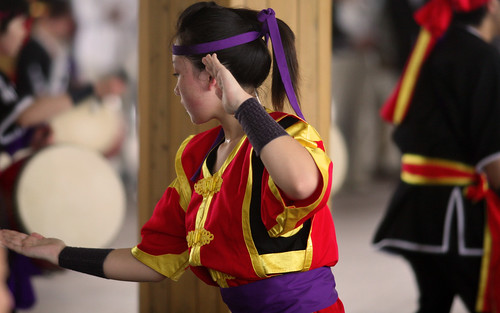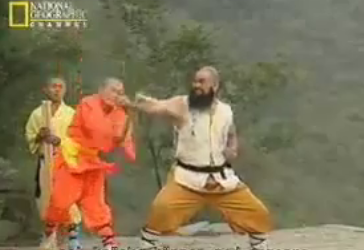
Image by Edwin1710 via Flickr.
There is little left to mysticism in martial arts today, with perhaps one very persistent exception: the concept of "chi" or "qi", depending on language. Qi is not recognized by the scientific community, mostly owing to the fact that there are no measurable or otherwise objectively observable features that reveal this "force" despite its alleged ubiquity and importance to human interaction and development. There is good reason for skeptics and scientists alike to laugh scornfully at anyone claiming to be able to harness qi. The burden of proof lies on those who claim that qi exists.
I fit squarely within the group of skeptics, and that leaves me somewhat torn. One one hand, I agree that qi should be discarded and left among the other lumber and wreckage of dead gods and dead philosophies that have proven by results to be empty fiction. On the other hand, I react to qi during my martial arts training, and having studied martial arts for more than a decade, I dare speak with at least some authority on martial arts theory and practice.
Some reactions might easily be explained by learning to somehow read another person's intentions, such as knowing whether to move out of the way of a strike depending on the opponent's facial expressions, but other reactions would be more difficult to explain. How, for example, can a person know when and where his opponent is striking when his back is turned to the opponent?
We have trained blindfolded where one student was assigned the role of an assassin, and the remaining students were to avoid being "killed" by the assassin. One person, who was not blindfolded, was to observe our behavior. I quickly learned not to trust my immediate senses, and instead relied on finding one of the weapons that were scattered around on the floor in the dojo for the purpose of this training. Once I had found a weapon, I pointed it in whichever direction it seemed to be the lightest, which according to the observer was always in the direction of the assassin. Those of us who had at least a few years of training reacted immediately by jerking away if someone suddenly aimed their weapons at us. Such plays do not prove the existence of qi, but they do indicate that something odd is going on. It may not be qi, but a "nine of out of ten" statistic in our training should raise an eyebrow.
The best explanation I can come up with involves our current knowledge of the human brain and consciousness. It is a fairly established fact that humans react to a huge array of stimuli of which we only become conscious of a tiny fraction. There are amusing examples, including the famous "invisible bear" video, which illustrates how even obvious events escape our consciousness. Other stimuli are so subtle that they stay below the consciousness "radar" even if we know they will occur, and if we do react to such stimuli, even our reactions may be too subtle to become conscious of, too. We are bombarded with stimuli that, both individually and combined, our consciousness will never detect (and for a healthy reason too, lest we become overburdened with input). Our bodies do receive the stimuli, however, and this I believe this is how qi may be explained.
Martial arts training teaches us certain moves that we learn to perform without thinking about them, and as one's skill improves, fewer and fewer moves become conscious. There is nothing mystery in this. It is like learning to ride a bike or how to tie your shoelaces: few of us give it any thought once we have learned it; we just do it. So, too, with martial arts moves. Similarly, we learn to react automatically to cues that are evident to begin with, but as we learn to react, we learn to recognize and react to preliminary cues as well. The cues become decreasingly evident, and eventually are too subtle to become conscious of. It is impossible to become conscious of, for example, a slight rustle of clothes in the distance, movements in the floor, slightly increased air pressure, weak shadows, tiny differences in temperature, and what else might reveal the presense and movement of an opponent, and much less to be capable of analyzing the combined stimuli and reacting consciously on them. In short, we learn to move without thinking according to stimuli that we do not think about.
Many of the seemingly impossible feats of highly skilled martial artists have little to do with hidden powers but are simple physics. For example, the ability to break a staff with one's arm is a question of tightening the muscle and positioning the arm at the precise spot on the staff where it is most likely to break, using one's arm as a pivot. It does not hurt, and it requires concentration more than anything else. I demonstrated it to my co-students last summer, and I am certainly no focused Shaolin monk.
The stimuli may not be recognized consciously, but sometimes they or their combined effect are nonetheless felt as a derived stimulus as the body reacts to them: you do not consciously detect the stimuli themselves, but you do discover your reaction. This reaction may be violent, it may be a strong feeling that "something is wrong," or it may be a feeling that your weapon is magnetically drawn to a certain direction—but there is never a rational explanation why. The feeling is real, and it may be strong, too.
I believe this is a rational approach to explaining what qi is. It is no force, and it does in fact not exist. However, the human consciousness is a rather limited faculty, and we physically sense much more than we become consciously aware of. Such stimuli are easily felt as some force emanating from others, and in a sense, it is fair to state that martial artists really do feel something from others and can bring the feeling to use, just like a martial artist may learn to cause certain reactions in other people; it is not qi, however, because it does not exist. To the best of my knowledge, it is the composite, secondary reaction to otherwise trivial stimuli.


